Browsing the bookshop of the future
- Published
creditlifschutzdavidsonsandilands.jpg)
Foyles's new London store is being designed to help people discover new books
More than 500 independent bookshops have shut in the UK and Ireland since 2005, according to the Booksellers Association (BA), in the face of competition from online retailers, supermarkets and e-books.
Bookshops are fighting back, though, and on Monday shop owners gathered at the BA's annual conference to discuss what "the bookshop of the future" will look like.
Get comfortable (but not too comfortable)
Cafes have become common features of bookshops in an effort to bring more customers through the doors and keep them there.
"Bookshops have their own advantages which Amazon and Kindle don't," says James Lowther, founding partner of advertising agency M&C Saatchi, who devised the current Books Are My Bag marketing campaign.
"Exploit your physical environment," he tells bookshop owners. "Do things like open cafes, but make it the best cafe in the town."
Booksellers Association chief executive Tim Godfray says stores could go one step further. "The idea of a bookshop with a bar sounds pretty civilised to me," he says.
"It would be great fun. You could sit back and peruse while having a nice cold glass of Chardonnay. You can't get that online."
But Miriam Robinson, head of marketing at Foyles, cautions against making visitors too comfortable.
"The idea of people dwelling all day with a book in their hand in a comfy chair is lovely," she says.
"But I think we all know it's not particularly financially sustainable. We can't really pay for people to sit on our couches and read our books all day."
Children are the future
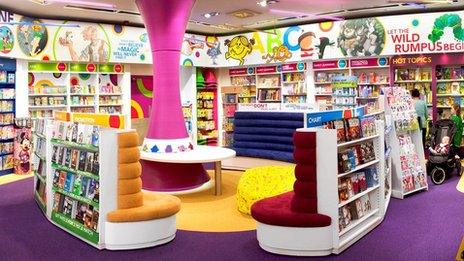
Irish chain Eason's have replaced some children's shelves with reading areas
Children's books have become increasingly important to High Street stores.
Children's bookshops have bucked the general downward trend, with no closures and two new stores opening in 2012, according to the BA.
Jo Henry, of research company Nielsen Book, says: "We do know that children's books are hugely important for independent bookshops. That's partly to do with the fact that people like to see what they're buying before they buy it."
Keith Butler, of Irish book chain Eason's, adds that children's titles have not yet become as popular in e-book formats as other genres.
In the refurbishment of the company's 60 stores, Eason's has replaced some children's shelves with games and seating areas where weekly children's readings take place.
Removing some stock was a "brave" move, he says, in the name of making the shops fun places to spend time and, hopefully, money.
"It really creates a strong retailing environment," he says. "Albeit a creche-like environment at times. But it has been well received."
More space, less clutter
Foyles, which claims to be Europe's biggest bookshop, is currently preparing to move down Charing Cross Road in London to a new state-of-the-art premises.
While the current store is "a little warren", the new shop will be spacious, open and designed to tempt customers to continually move through the shop, Miriam Robinson explains.
The aim is to encourage book-lovers to stumble upon - and buy - things they did not realise they wanted.
"What good bookshops do well is that they encourage this serendipity, this stumbling onto something that you never thought you would find," Ms Robinson says.
"Those are the moments that we all cherish, right? Those are the moments that we remember - when you found that book that you didn't know you wanted and that changed your life."
Mr B's Emporium of Reading Delights in Bath is regarded as one of the country's most esoteric and successful independent bookshops.
"We don't cram everything in. We leave a lot of space," explains owner Nic Bottomley.
Everything is geared towards "the need to create somewhere where people want to spend a lot of time", he says.
Despite the recession, Mr B's profits have risen every year since the shop opened in 2006, he says, adding: "Right now it's going up at a faster rate than ever."
The personal touch
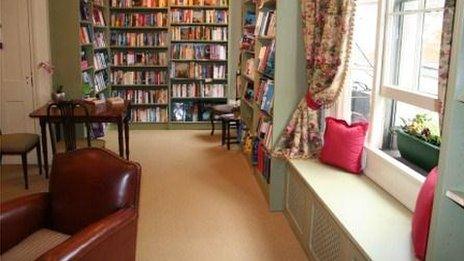
Mr B's Emporium in Bath offers a "reading spa" in its bibliotherapy room
"The lovable and adorable bookshops are the ones that are friendly," says author Bill Bryson, who spoke at the BA conference.
"One thing High Street bookshops can do is they can hand sell. They can recommend things. Then customers will come back because they know they can count on you. And they'll be more likely to pay what has become a premium."
The personal touch is the major advantage brick-and-mortar booksellers have over their digital competitors, James Lowther believes.
"You've got a human being standing there as opposed to an algorithm," he says. "The human being has got to know how to talk to the customer, relate to them and build up a relationship."
The art of making recommendations is at the heart of Mr B's Reading Spa offer. Visitors to the Reading Spa spend an hour with a member of the book shop staff, who suggests books based on the readers' tastes.
A postal version promises to send recipients a new book every month based on their answers to a questionnaire.
Embracing technology
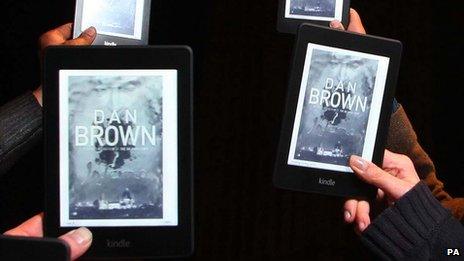
Bookshops have faced a dilemma over whether to embrace or resist technology
Where once e-readers were viewed with suspicion as "the enemy" by bookshop owners, most now admit they cannot hold back the tide.
"I sell e-readers and I try to sell e-books," says BA chairman Patrick Neale, who runs the Jaffe & Neale bookshop in Chipping Norton, Oxfordshire. "I'm determined not to look old-fashioned."
In Eason's in Ireland, staff members guide e-reader buyers through the process of downloading their first e-book from the shop's online store, meaning they are more likely to purchase from the chain's digital arm in the future.
At Blackwell's, staff are armed with tablets for ordering books they do not have in stock.
"If the shop doesn't have it on the physical shelf, they can search for the book and say, 'Yeah we've got it online, would you like us to post it to you or would you like to come and get it tomorrow?'" digital director Matthew Cashmore says.
Keith Butler believes in-store book ordering will eventually be taken out of the staff's hands.
"Over time I think it's going to evolve in terms of being able to do it either on your phone from within the store or through touch screens," he says. "I think that's where the book sector has to get to."
Bespoke books
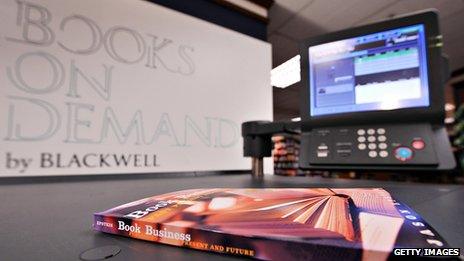
Print-on-demand machines have not taken off, but are getting cheaper and faster
Last year, Mr B's Emporium loved The Howling Miller by Finnish author Arto Paasilinna so much that the shop got its own limited run of 300 hardback copies published.
More bookshops could champion their favourite books with bespoke editions, even becoming mini-publishers in their own right, Patrick Neale believes.
"I'm mulling that over," he says. "There's lots of fantastic Cotswold country writing that's out of print so I would love to reprint that and do it beautifully and be in control of that. And then there's championing new authors as well, so there are lots of different ways of approaching it."
Print-on-demand machines, which were touted as the solution for when shops did not have a particular title in stock, have so far failed to take off. But technological advances are said to be making them quicker and cheaper, so they may yet make an appearance in the bookshop of the future.
Literary 'death matches' - and other events
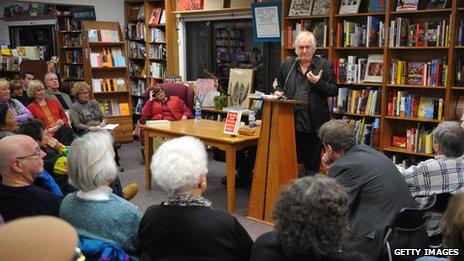
Personal visits to shops by authors cannot be replicated online
Author readings and signings have long been held in bookshops, and are valuable for getting crowds through the doors. Plus there is no digital substitute for a book signed by your favourite author.
Bookshops have also branched out with concerts, quizzes, book groups, literary tours and other bookish events.
Then there are left-field innovations such as literary "death matches", raucous readings where authors do battle on stage.
"People want to be more active participants in their experience," says Miriam Robinson of Foyles. "People want to make it a social evening. They want to be able to engage with the authors while they're talking."
Ms Robinson says live attractions such as children's illustration will take place in different areas of the new Foyles shop, as well as in the dedicated events area.
Bookshop on tour
"If customers aren't coming to you, then you have to take what you feel passionately about to them," says Patrick Neale.
He has taken a pop-up branch of his store to the Wilderness music festival for the past two years.
"We take a marquee and take our bookshop and cafe," he says. "I thought this would be madness - 20,000 very drunk people partying and listing to rock music.
"And they've bought books. We create exactly the same environment as in Chipping Norton and taken it to a field in the middle of the countryside. The rewards were good. It's very hard work. It's about human contact and about adding value to everything that we do."
- Published18 September 2013
- Published4 July 2013
- Published24 October 2012
- Published2 July 2012
- Published4 October 2011
- Published4 October 2011